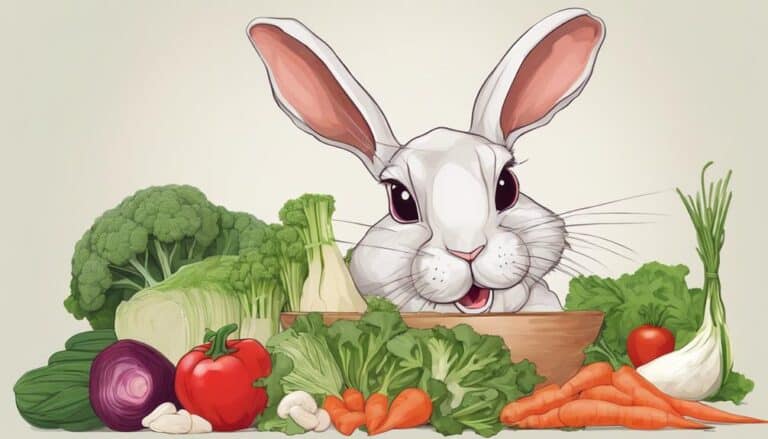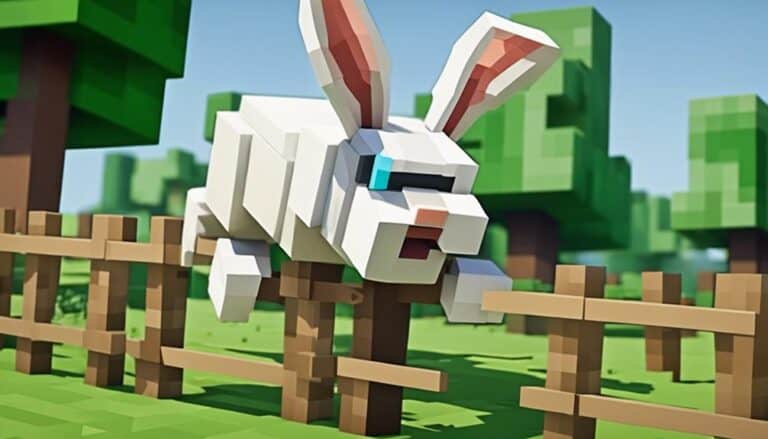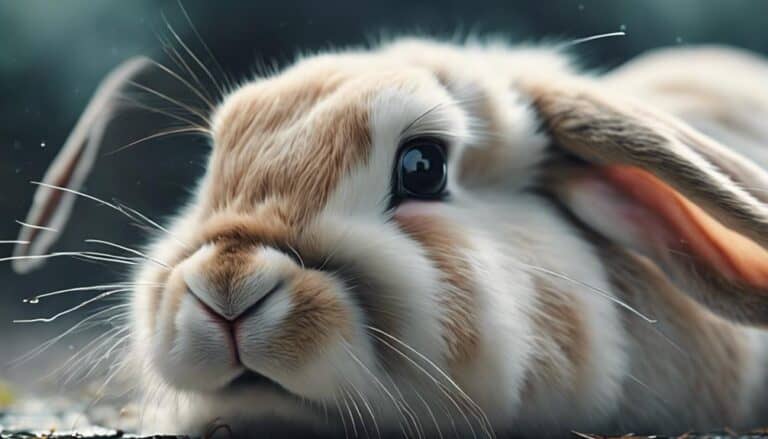Imagine you're pondering the necessity of a salt lick for your fluffy bunny. While the debate around this topic continues, it is crucial to ponder the role of salt in your rabbit's diet.
You might be surprised to discover the intricate balance required for your bunny's well-being. Let's explore the intricacies of salt licks and their impact on your bunny's health.
Contents
Key Takeaways
- Salt licks aid in essential mineral intake for rabbit health.
- Monitoring salt intake and water consumption is crucial.
- Excessive salt from licks can lead to health issues.
- Natural alternatives like twigs and DIY options are beneficial.
Importance of Salt Licks for Bunnies
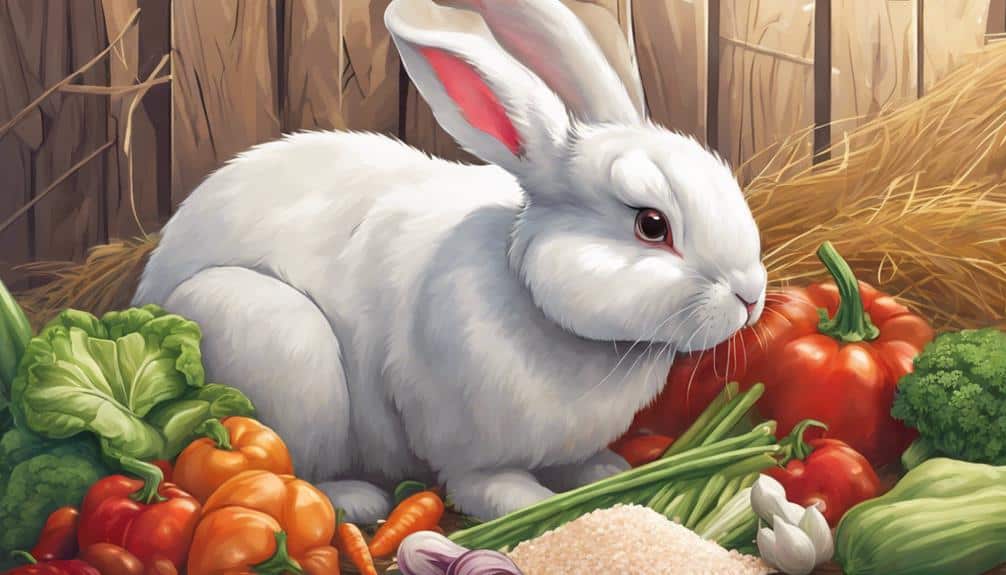
Salt licks play an important role in maintaining the health and well-being of bunnies by providing essential minerals needed for their overall physiological balance. Rabbits require a balanced diet to thrive, and salt licks contribute to this balance by supplying vital minerals like sodium. These minerals aid in regulating electrolyte balance within the body, ensuring proper functioning of bodily processes such as blood pressure and fluid levels.
Additionally, salt licks serve as a source of enrichment for rabbits, preventing boredom and promoting mental stimulation. By encouraging rabbits to interact with salt licks, owners can also help in keeping their pets' dental health in check. The act of licking the salt lick can help wear down the rabbit's teeth, preventing overgrowth and potential dental issues.
Incorporating salt licks into a rabbit's environment not only provides essential nutrients but also contributes to their overall well-being. Remember, ensuring proper water intake alongside salt lick usage is important for maintaining a healthy balance in your rabbit's diet.
Necessary Salt Intake for Bunnies
To guarantee the best health of your bunny, understanding the necessary salt intake is essential for maintaining their overall well-being and physiological balance. Rabbits need salt as part of a healthy diet to support various bodily functions. While the exact amount of salt required for rabbits isn't extensively studied, they typically require up to 0.5% salt in their diet, as recommended by the National Research Council.
Specialized rabbit foods often contain the necessary minerals, including sodium, to meet their nutritional needs. Wild rabbits have been observed instinctively regulating their sodium intake by licking rocks in their environment, indicating the importance of this mineral in their diet. Salt licks or mineral blocks have historically served as a supplement to compensate for mineral deficiencies in natural diets, especially in wild rabbits.
Ensuring your bunny has access to proper nutrients, including salt, and monitoring their water intake can contribute to their overall health and well-being.
Potential Harm of Salt Licks
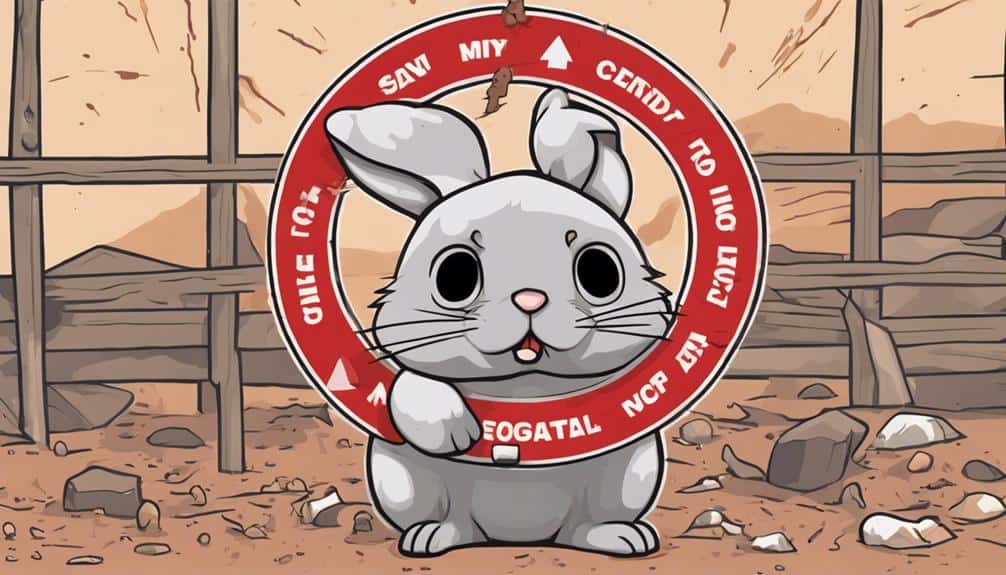
Caution should be exercised when contemplating the use of salt licks for rabbits due to the potential risks associated with excessive consumption. Salt licks, although seemingly beneficial, can actually pose harm to your rabbits. Here are some key points to contemplate:
- Dehydration Risk: Excessive salt intake from salt licks can lead to severe dehydration in rabbits, impacting their overall health and well-being.
- Bladder Stones Formation: Salt licks may contribute to the formation of bladder stones in rabbits, causing discomfort and potential health complications.
- Unnecessary Addition: Offering salt licks to rabbits is unnecessary and can potentially harm their health if not monitored closely.
- Alternative Solutions: Instead of salt licks, have electrolyte replacers on hand for dehydrated rabbits and focus on monitoring their salt intake while ensuring they've a balanced diet.
Salt Licks Vs. Mineral Blocks
Considering the differing mineral compositions and potential benefits, it's important to understand the distinctions between salt licks and mineral blocks for rabbits. Salt licks primarily consist of pure salt, providing a source of essential sodium. On the other hand, mineral blocks offer a mix of essential trace minerals like calcium and zinc, which are vital for overall health. While salt licks are typically white in color, mineral blocks come in various colors, reflecting their diverse mineral content.
Both salt licks and mineral blocks act as supplemental sources of necessary minerals beyond a rabbit's regular diet. Providing a choice between a salt lick and a mineral block can help rabbits receive a balanced intake of essential nutrients. By offering both options, you can support your rabbits in meeting their mineral requirements and promoting their well-being. Remember that each type serves a unique purpose, so incorporating both into your rabbit's environment can offer them a more effective range of necessary minerals for optimum health.
Homemade Salt Lick Options
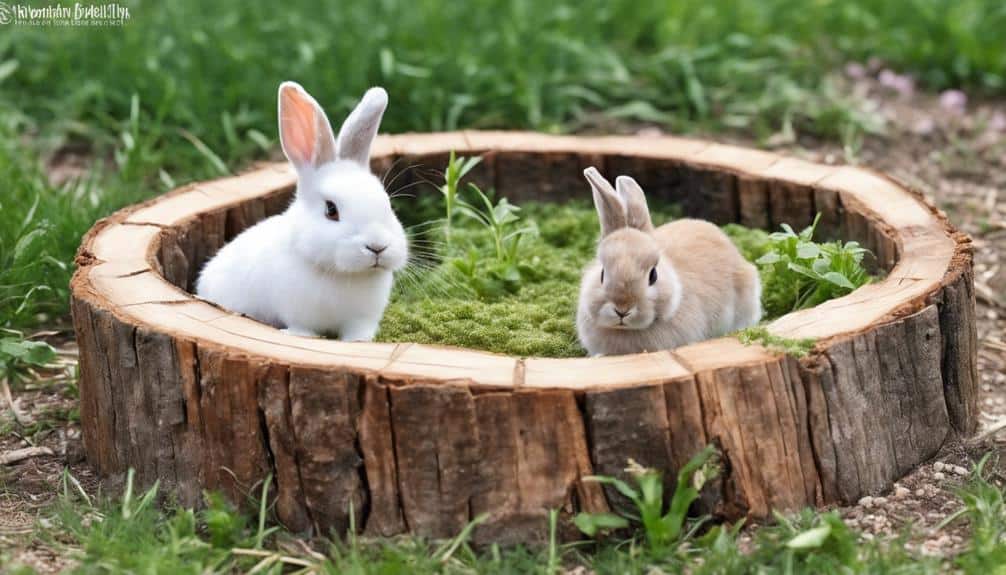
When considering homemade salt lick options for your bunnies, you have a variety of choices available to meet their dietary needs.
Mixing salt with water and baking it until hard, using unsalted peanut butter as a binder, or incorporating molasses and honey are all viable options.
Adding herbs or dried fruits can also create a flavorful homemade salt lick that allows for customization based on your rabbit's preferences.
DIY Salt Lick Recipes
To create homemade salt licks for your bunnies, combine unrefined sea salt, water, and optional herbs or vegetables to cater to their dietary needs and preferences. Here are some DIY salt lick recipes to contemplate:
- Salt with Molasses: Mix unrefined sea salt with molasses for added nutrients and a sweet taste.
- Salt with Honey: Combine unrefined sea salt with honey to provide a natural and flavorful option.
- Salt with Apple Cider Vinegar: Mix unrefined sea salt with apple cider vinegar for additional health benefits.
- Herbal Infusion: Infuse the salt lick mixture with fresh leafy greens or herbs to enhance the flavor and offer variety to your rabbit's diet.
These homemade options can be a healthy and cost-effective way to supplement your rabbit's diet with essential minerals.
Natural Salt Lick Alternatives
Homemade salt licks for your bunnies can be easily created using rabbit-safe ingredients like oats, hay, and water to form a paste, offering a natural and healthy alternative for their mineral needs.
Natural salt lick alternatives can include providing rabbit-safe twigs, branches, or untreated wooden blocks for chewing.
Incorporating rabbit-safe fruits and vegetables like carrots, apples, and leafy greens, frozen with water, can create an invigorating and enriching treat.
Additionally, offering hay cubes soaked in water or rabbit-safe herbal teas can provide hydration and mental stimulation.
For a simple DIY option, mixing sea salt with water to form a paste and allowing it to harden provides a lickable mineral source for your rabbits.
Consider these alternatives to cater to your bunnies' mineral requirements naturally.
Alternatives to Salt Licks
You can explore natural dietary supplements and mineral-rich food options as alternatives to salt licks for your bunnies.
These options can provide essential minerals and trace elements necessary for your rabbit's overall health.
Natural Dietary Supplements
Natural dietary supplements such as herbs, vegetables, and fruits can effectively provide essential nutrients for rabbits without the reliance on salt licks. To make sure your rabbit's diet is balanced and healthy, consider incorporating the following items:
- Leafy greens – Provide a variety of fresh leafy greens like kale, parsley, and dandelion greens.
- Herbs – Include herbs such as cilantro, basil, and mint to add flavor and essential nutrients.
- Vegetables – Offer vegetables like carrots, bell peppers, and broccoli to provide a mix of vitamins and minerals.
- Fruits – Treat your rabbit with small amounts of fruits like apples, strawberries, and blueberries as occasional snacks.
Mineral-Rich Food Options
Mineral-rich food options like leafy greens and vegetables provide essential nutrients for rabbits as alternatives to salt licks. Rabbits don't need salt licks or mineral blocks in their diet as they can get the necessary minerals and nutrients from a balanced diet of pellets, supplemented with a variety of natural foods.
Leafy greens they receive, such as kale and spinach, offer calcium, while vegetables like broccoli and carrots provide potassium and magnesium. Timothy hay and oat hay contribute fiber and minerals like phosphorus, fulfilling the nutrient requirements of rabbits without the need for additional sodium intake.
Opting for herbs such as parsley and dill can introduce iron and manganese, and fruits like apples and bananas offer potassium and copper, ensuring small animals like rabbits receive a healthy diet without excessive salt intake.
Best Practices for Bunny Care
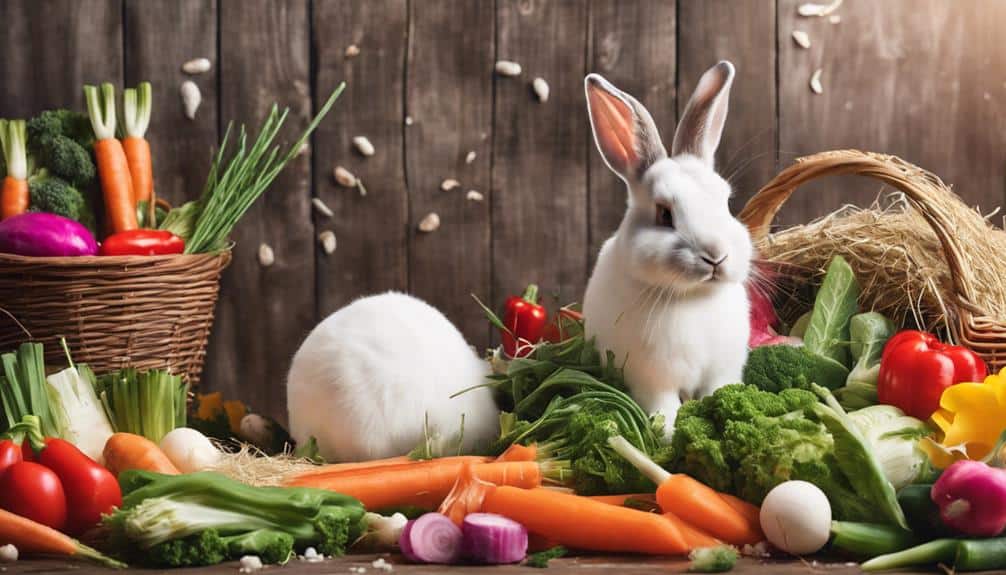
For ideal bunny care, prioritize a balanced diet rich in quality pellets, hay, and leafy greens to meet their nutritional needs. Here are some best practices to make certain your bunny stays healthy and happy:
- Nutrient-Rich Diet: Provide a mix of pellets, hay, and leafy greens to meet your pet rabbit's dietary needs without the necessity for salt licks.
- Regular Monitoring: Keep an eye on your rabbit's salt intake, especially if they've specific dietary requirements, to avoid deficiencies or excessive consumption.
- Stimulation: Offer mental and physical stimulation to prevent boredom, which can lead to overconsumption of salt licks as a source of entertainment.
- Understand Behavioral Patterns: Recognize that most licking behaviors in rabbits are social or grooming-related, not necessarily indicating a need for salt. Salt licks can be given occasionally as a treat rather than a primary source of salt.
Frequently Asked Questions
What Pets Need Salt Licks?
For pets like birds, horses, dogs, cats, hamsters, guinea pigs, cattle, goats, poultry, sheep, fish, reptiles, wild and domestic animals, zoo animals, exotic pets, livestock, farm animals, small and large mammals, salt licks can be beneficial for essential mineral intake and overall health.
How Do You Make a Salt Lick for Rabbits?
To make a salt lick for rabbits, mix water with iodized salt or sea salt and add crushed pellets or hay for texture. Pour into a container, let it harden, and offer it in moderation for sodium.
Does Salt Attract Rabbits?
Salt attracts rabbits due to their need for essential minerals like sodium. Their behavior reflects a preference for salt intake, vital for rabbit nutrition and health. Salt consumption helps prevent deficiencies, making salt licks a beneficial option.
Do Rabbits Crave Salt?
Craving salt can indicate health issues in rabbits. While they do not typically require salt licks due to dietary needs, consider natural behaviors, taste preferences, and maintaining nutritional balance. Monitor for salt sensitivity and explore suitable mineral supplements.
Conclusion
To sum up, while salt licks aren't vital for bunnies with a balanced diet, they can provide additional nutrients. It's important to monitor your bunny's salt intake to prevent any potential harm.
Consider offering homemade salt lick options or alternative sources of essential minerals. Remember, a healthy diet is key to keeping your bunny happy and thriving.
So, why not hop to it and guarantee your furry friend's well-being today?


